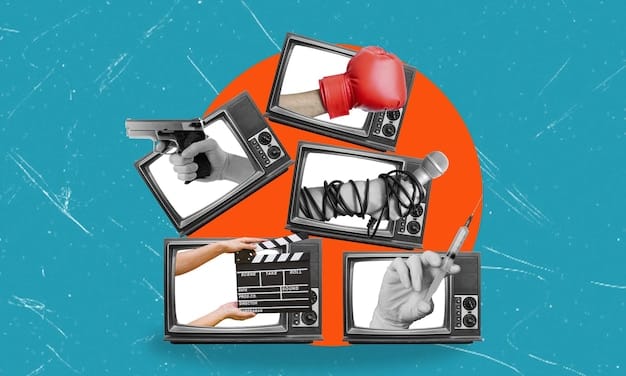Spoiler-Free Guide: Ethics of Film Criticism in Brazil

Spoiler-Free Guide: The Ethics of Film Criticism in Brazil: A Spoiler-Free Discussion explores the delicate balance between providing insightful commentary and preserving the viewing experience for audiences, especially considering the cultural nuances and expectations within Brazil.
Navigating the world of film criticism can be tricky, especially when trying to balance insightful commentary with the audience’s right to experience a film without spoilers. This Spoiler-Free Guide: The Ethics of Film Criticism in Brazil: A Spoiler-Free Discussion examines the unique challenges and considerations within the Brazilian cinematic landscape.
Understanding the Role of Film Criticism
Film criticism plays a vital role in shaping public perception and appreciation of cinema. It offers analysis, interpretation, and context, enriching the viewer’s understanding of the art form. But where do we draw the line between critical insight and ruining the experience for others?
In Brazil, film criticism has both a rich history and a growing presence online. As such, the ethical considerations surrounding spoilers and fair commentary are becoming increasingly important. Let’s explore the foundations of effective and ethical film critique.
The Purpose of Film Criticism
At its core, film criticism seeks to examine and evaluate a film’s artistic merit, technical aspects, and cultural significance. It serves as a bridge between filmmakers and audiences, promoting dialogue and deeper engagement with the medium.
What Makes Criticism Ethical?
Ethical film criticism prioritizes accuracy, fairness, and respect for both the filmmakers’ intentions and the audience’s viewing experience. It avoids personal attacks, biases, and, crucially, spoilers.

Here are some key elements of ethical film criticism:
- Accuracy: Ensuring that all factual claims and background information are correct and verifiable.
- Fairness: Presenting a balanced and objective perspective, even when expressing criticism.
- Respect: Avoiding personal attacks or disparaging remarks about the filmmakers or actors involved.
- Spoiler-Free: Protecting the audience’s right to experience the film without knowing key plot points or surprises.
Ethical film criticism is about enhancing the filmgoing experience, not detracting from it. This balance can be challenging, especially in a culture that increasingly values instant information and immediate reactions.
Brazilian Cinema and Cultural Context
To understand the ethics of film criticism in Brazil, it’s vital to acknowledge the unique cultural context that shapes both filmmaking and audience expectations. The Brazilian film industry has a long and vibrant history, marked by both artistic triumphs and socio-political challenges. This history informs how films are made, received, and discussed.
Brazil boasts a diverse and passionate film audience, with varied tastes and levels of exposure to global cinema. These factors influence the role and responsibilities of film critics.
Here’s how cultural context impacts film criticism in Brazil:
- Historical Significance: Understanding the history of Brazilian cinema helps critics contextualize and interpret contemporary films in light of past achievements and struggles.
- Socio-Political Themes: Many Brazilian films tackle complex social and political issues, which require critics to have a nuanced understanding of the country’s history and current challenges.
- Audience Expectations: Knowing the demographics and preferences of the Brazilian audience allows critics to tailor their reviews and analyses to resonate with local viewers.
- Cultural Sensitivity: Critics need to be mindful of cultural sensitivities and avoid making generalizations or stereotypes about Brazilian society or its people.
Cultural context enriches film criticism, making it a more meaningful and relevant experience for both critics and audiences. By understanding the cultural nuances of Brazilian cinema, critics can offer deeper and more informed analyses that resonate with local viewers.
The Spoiler Dilemma: Walking the Ethical Tightrope
The most pressing ethical concern for film critics today is the spoiler “dilemma”. Spoilers, defined as revealing key plot points or surprises, can ruin the viewing experience for audiences. Balancing the need to provide insightful commentary with the desire to protect the audience from spoilers is a constant challenge.
In Brazil, where word-of-mouth and social media play a significant role in film promotion, the impact of spoilers can be particularly damaging. Critics must learn to strike the delicate balance between insightful analysis and responsible disclosure.
Defining What’s Considered a Spoiler
This is a complex issue, as what constitutes a spoiler varies from person to person. Generally, it includes revealing major plot twists, character deaths, surprise endings, or significant character relationships.
Techniques for Avoiding Spoilers
Critics have developed various techniques for avoiding spoilers while still providing meaningful analysis:
- Focus on Themes and Tone: Discussing the themes, mood, and overall message of the film without revealing specific plot details.
- Analyzing Performances: Highlighting the performances of the actors and actresses without disclosing their characters’ fates or trajectories.
- Discussing Cinematography and Directing: Examining the technical aspects of the film, such as cinematography, editing, and directing, without giving away plot points.
- Using Trigger Warnings: Providing warnings at the beginning of a review or article to alert readers to potentially sensitive content or plot elements.
Avoiding spoilers is not about dumbing down criticism, but rather about finding creative and responsible ways to engage with a film and its audience. It requires a bit of ingenuity to create a meaningful piece without saying too much, something that is highly valued.
The Rise of Social Media Criticism
Social media has dramatically changed the landscape of film criticism, making it more accessible and immediate than ever before. Platforms like Twitter, Facebook, and Instagram have empowered everyday viewers to share their opinions and analyses with the world. While this has democratized film criticism, it has also raised new ethical concerns.
In Brazil, where social media usage is high, the influence of social media critics is considerable. Understanding the impact and ethical responsibilities of these platforms is essential.
The Democratization of Film Criticism
Social media has given a voice to previously unheard voices, allowing diverse perspectives and opinions to be shared and debated. This has enriched the discourse around film and broadened the audience for film criticism.
The Challenge of Brevity
Social media platforms often demand brevity, which can make it difficult to provide thoughtful and nuanced analysis. Critics must learn to convey their ideas succinctly and effectively while still maintaining ethical standards.

The Risk of Spoilers
The immediacy of social media can also increase the risk of accidental or intentional spoilers. Critics must be especially careful to avoid revealing key plot points or surprises in their tweets, posts, or videos.
Ethical social media criticism requires responsible dissemination of information. Critics must be mindful of the potential impact of their words and actions for the community, especially when spoilers are involved.
Objectivity vs. Subjectivity: Finding the Balance
Film criticism inherently involves a blend of objectivity and subjectivity. While critics strive to provide accurate and unbiased analyses, their personal experiences, values, and perspectives inevitably shape their interpretations to a certain extent.
In Brazil, where cultural and political contexts strongly influence artistic expression, the balance between objectivity and subjectivity is particularly important. Critics must acknowledge their biases and strive for fairness and impartiality while also recognizing the role of personal interpretation.
Objectivity in Film Criticism
Objectivity in film criticism refers to the use of evidence, logic, and established criteria to support claims and evaluations. It involves analyzing technical aspects, historical context, and artistic merit without letting personal preferences unduly influence judgment.
Subjectivity in Film Criticism
Subjectivity in film criticism refers to the role of personal experience, values, and perspectives in shaping interpretations and evaluations. It acknowledges that film viewing is a subjective experience and that different viewers may have different reactions to the same film.
Striving for Transparency
Ethical film criticism requires transparency about the critic’s biases and perspectives. Critics should acknowledge their personal preferences and avoid presenting their opinions as objective truths.
Critics must bring to bear their awareness, both objective and subjective, to facilitate an honest and thorough critique. The critic’s role is as a mediator between audience and art, where the goal is to encourage positive interplay.
The Future of Film Criticism in Brazil
The future of film criticism in Brazil is likely to be shaped by several factors, including technological advancements, changing audience expectations, and the evolving role of social media. Navigating these trends ethically will be crucial for the long-term health and relevance of film criticism in the country.
The increased accessibility of film through streaming services and online platforms will continue to disrupt traditional models of film distribution and consumption. Film critics will need to adapt their strategies and approaches to remain relevant in this evolving landscape.
Consider these potential developments:
- Artificial Intelligence: AI-powered tools may assist critics with research, analysis, and fact-checking, but ethical concerns about bias and objectivity will need to be addressed.
- Interactive Experiences: New forms of interactive storytelling may require critics to develop new critical frameworks and approaches.
- Virtual Reality: The rise of VR filmmaking may challenge traditional notions of cinematic space and audience engagement.
The future of film criticism will require critics to remain adaptable, ethical, and engaged with the changing landscape of cinema and technology. By embracing new platforms and approaches while upholding ethical principles, film critics can continue to play a vital role in shaping the future of film in Brazil.
| Key Point | Brief Description |
|---|---|
| 🎬 Role of Film Criticism | Analyzes artistic merit, technical aspects, and cultural significance; promoting dialogue. |
| 🛡️ Avoiding Spoilers | Focus on themes, performances, and cinematography instead of revealing key plot points. |
| 📱 Social Media Impact | Democratizes film criticism, requiring ethical responsibility due to immediate widespread influence. |
| ⚖️ Objectivity vs. Subjectivity | Balance personal interpretations with fair, unbiased analysis, acknowledging cultural contexts. |
Frequently Asked Questions
▼
Ethical film criticism balances insightful analysis with responsible disclosure, avoiding spoilers and exhibiting respect for filmmakers and audiences. It strives for accuracy and fairness in evaluations.
▼
Critics can focus on discussing themes, analyzing performances, and examining cinematography without revealing major plot points or surprise endings. This allows for thoughtful critique without ruining the viewing experience.
▼
Social media has democratized film criticism, offering a platform for diverse voices. However, this also demands heightened ethical responsibility; critics must avoid spoilers in their concise, immediate posts.
▼
Understanding Brazilian cinema’s history and socio-political themes allows critics to offer nuanced analyses. Recognizing audience expectations and cultural sensitivities further enriches the critique, making it more relevant.
▼
Ethical film criticism merges objective evaluation with transparently subjective interpretations. Critics acknowledge personal biases while striving for fairness and impartiality, ensuring comprehensive, valuable content.
Conclusion
Ultimately, the ethics of film criticism in Brazil, especially regarding spoilers, relies on balancing insightful commentary with respect for the viewing experience. As social media and technology evolve, critics must adapt while prioritizing fairness, accuracy, and responsible disclosure to enrich rather than diminish appreciation for the art of cinema.





